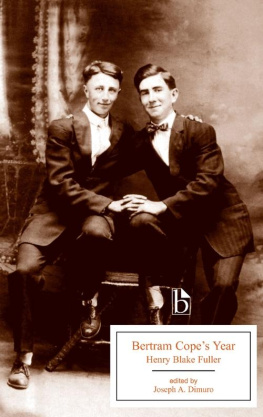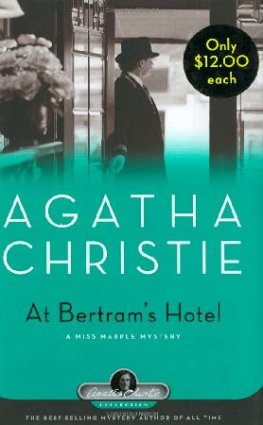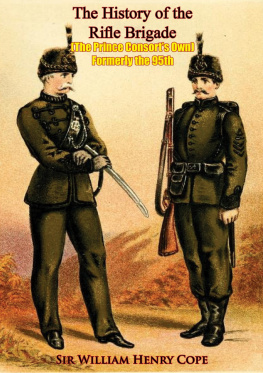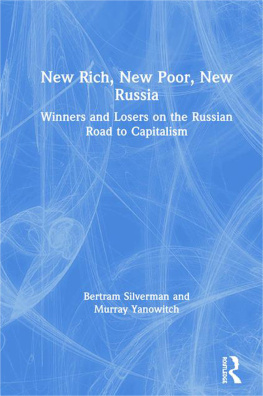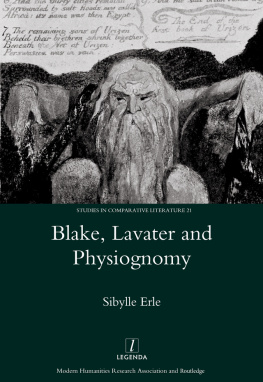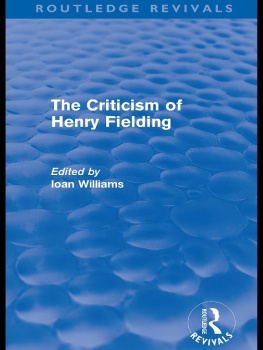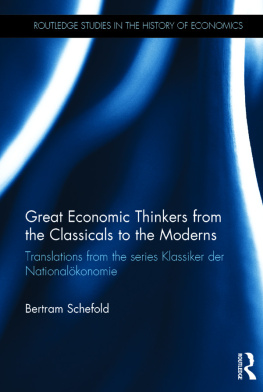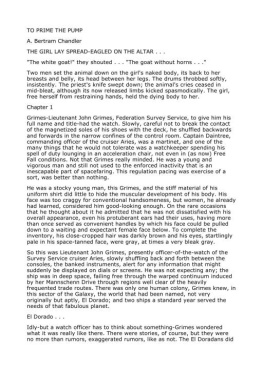Henry Blake Fuller - Bertram Cope’s Year
Here you can read online Henry Blake Fuller - Bertram Cope’s Year full text of the book (entire story) in english for free. Download pdf and epub, get meaning, cover and reviews about this ebook. year: 2010, publisher: broadview, genre: Art. Description of the work, (preface) as well as reviews are available. Best literature library LitArk.com created for fans of good reading and offers a wide selection of genres:
Romance novel
Science fiction
Adventure
Detective
Science
History
Home and family
Prose
Art
Politics
Computer
Non-fiction
Religion
Business
Children
Humor
Choose a favorite category and find really read worthwhile books. Enjoy immersion in the world of imagination, feel the emotions of the characters or learn something new for yourself, make an fascinating discovery.
- Book:Bertram Cope’s Year
- Author:
- Publisher:broadview
- Genre:
- Year:2010
- Rating:4 / 5
- Favourites:Add to favourites
- Your mark:
- 80
- 1
- 2
- 3
- 4
- 5
Bertram Cope’s Year: summary, description and annotation
We offer to read an annotation, description, summary or preface (depends on what the author of the book "Bertram Cope’s Year" wrote himself). If you haven't found the necessary information about the book — write in the comments, we will try to find it.
Bertram Cope’s Year — read online for free the complete book (whole text) full work
Below is the text of the book, divided by pages. System saving the place of the last page read, allows you to conveniently read the book "Bertram Cope’s Year" online for free, without having to search again every time where you left off. Put a bookmark, and you can go to the page where you finished reading at any time.
Font size:
Interval:
Bookmark:
I wish to thank the staff of the Newberry Library in Chicago, Illinois, for their unfailing courtesy and helpfulness in completing this edition. Archival materials from the Henry Blake Fuller Papers, Midwest Manuscript Collection, are used with the permission of the Newberry Library. Funding for research was provided by several Non-Senate Professional Advancement Grants I was awarded at UCLA, for which I am extremely grateful. I wish to thank Christopher Looby for his wise and welcome advice in all matters professional and personal. And finally I dedicate this edition of Bertram Copes Year to the irrepressible spirit of my mother, Bella M. Dimuro.
[The following emendations and additions to , which appear in brackets, are taken from a nine-page manuscript written in Fullers hand a few months after the publication of the novel and dated 11 January 1920. Henry Blake Fuller Papers (Box 7, Folder 262), Midwest Manuscript Collection, Newberry Library, Chicago.]
Carolyns but firmly, from the garden of desire.
You look better already, Medora said to Cope. Youll go back to-morrow a new man.
Her elbow was on the back of the settle and close to his shoulder. His face caught the glow from the fire.
Oh, Im all right, I assure you, he said.
You do look better, observed Carolyn on her own account. This air is everything. Only a few hours of it
Another bit of wood on the fire, if you please, Carolyn, said her patroness.
Let me do it, said Cope. He rose quickly and laid on a stick or two. He remained standing on the edge of the glow. He hoped nobody would say again that he was looking rather thin and pale.
[Before supper there had been a quarter-hour of doorstep astronomy, under a clear firmament which brought every member of Aprils celestial
How much you know! sighed Medora, in all humility. She looked up at Cope as he still stood against the corner of the fireplace. She became conscious that there was no definite way of filling up the evening. Entertain us, she said. Tell us a story.
Do, seconded Carolyn.
Cope glanced about the room, as once, in similar circumstances,
Well began Cope.
You have an idea! cried Medora. I see it in your face.
Well said Cope again.
He had recently been puzzling through one of the early books of Anatole France, and the sight of the stars had brought back to mind a page in the Jardin dEpicure. A variation on that theme might be made to do.
One night, he began, the Master of All
Who is he? asked Medora.
Why, you know, replied Cope, rolling his eyes ceiling ward. Its in capitals.
I understandof course, returned Medora.
the Master of All, in a moment of careless leisure, was
Medora gave him a quick glance of doubt.
Youre not going to be irreligious, nor profane?
I hope not. Was looking over the cosmos. All the great suns were shining as usualVega, Aldebaran, Canopus
Do I know about Canopus? asked Medora.
Well, it isnt quite visible in this latitude. You can see it by going down to the Gulf of Mexico. Supposed to be the biggest of them all, and the possible center of the universe.
Keep it in, of course, said Medora. Ill remember.
Canopus, and millions more. All at once His attention happened to be taken by a very little sun, away off in an odd, unregarded corner.
Our sun, Im sure, said Carolyn softly.
Copes look rewarded her perspicacity.
This poor little sun, which wasnt at all bright nor at all fast, was pegging away the best it could. It was attended by an outfit of planets, and was going ahead doggedly, like an old carthorse surrounded by a pack of bothersome, yelping curs
Is that the way you see our Solar System? demanded Medora, going into capitals herself.
We are trying for philosophical detachment, said Carolyn, in mollification.
Well, go on, directed Medora, only half reconciled.
One of these, in particular, was worse than any of the others,noisier, and all covered with a rash, or rather a mange. The Master summoned one of his celestial familiars
Some archangel, doubtless, observed Carolyn.
and asked what the matter mightshook his head and said he didnt know,had never noticed the whelp before at all.
Somebody must know, the majestic voice went on, showing discontent and impatience. And of course somebody did. Up stepped a small neophyte, or incense-swinger, or whatever,theres always some young smarty near by who knows it all
Bertram Cope, you be careful, counselled Medora.
Copes look in return indicated that the worst was now nearly over and asked for leave to finish.
And he did know. That scabby object, he said, is called The Earth.
Is this correct? asked the Master over his shoulder.
It is, said an older attendant, near by. Just at present, and in its own vicinity, it is so designated.
And what is the name of its disease? the Master, willing to encourage a promising member of the force, asked the youngster.
But the boy had told all he knew. He retired, and the older personage spoke again.
Its disease is called humankind.
Medora gave a grimace of disrelish.
And how long has it been afflicted in this way?
Why, really, Sir, no time at all. The record of the case runs back only a few thousand years.
I see. Then I suppose I neednt trouble about it? Nature may be left to take its course?
Undoubtedly. In another few thousand years any slight surface-trouble will probably disappear and that poor little sphere regain its original fairness
Please stop, said Medora.
Cope promptly ceased. He had made his point.
Carolyn considered him. Yes, he might yet become a poet, however perverse and left-handed a one.
There was a short silence. Cope continued to stand at his post, and Medora tried to thrust a discredited world from her thoughts. When next she spoke it was with a complete change of subject.]
And what is Mr. Lemoyne doing this evening? [she asked in an abstracted tone. She had reached a manner that was casual and negligent, and her voice was low and leisurely. She seemed to place Lemoyne at a distance of many, many leagues. Indeed he appeared small and remote after their gallopade through the universeand beyond.]
Rehearsing, I suppose?
visible in the night sky in winter in the Northern Hemisphere.
Regulus, in the constellation Leo, and Rigel, in the constellation Orion, are among the brightest stars in the night sky. Orion and Cygnus are highly recognizable and conspicuous constellations, Cygnus featuring the so-called Northern Cross.
in the constellation Virgo. Denebola is the second brightest star in the constellation Leo.
xd.
brightest star in the southern constellation of Carina.
Names of archangels, members of the high-ranking second choir of angels in Christian belief and intercessors between God and humans.
[In this passage France describes the passing of the Medieval conception of the heavens, replacing the theological interpretation with a modern, scientific one. Ever the skeptic, France emphasizes the relatively insignificant place of the Earth in the greater scheme of the universeand mans place in itdisplacing the Earth from its central position in an older cosmology. That Cope has been reading France is an indication of his own attraction to controversial, if somewhat New Age, ideas that challenge orthodox belief.]
We find it hard to picture to ourselves the state of mind of a man of older days who firmly believed that the Earth was the centre of the Universe,sundry great clocks compacted and painted by the craftsmen of the Middle Ages.
Font size:
Interval:
Bookmark:
Similar books «Bertram Cope’s Year»
Look at similar books to Bertram Cope’s Year. We have selected literature similar in name and meaning in the hope of providing readers with more options to find new, interesting, not yet read works.
Discussion, reviews of the book Bertram Cope’s Year and just readers' own opinions. Leave your comments, write what you think about the work, its meaning or the main characters. Specify what exactly you liked and what you didn't like, and why you think so.

